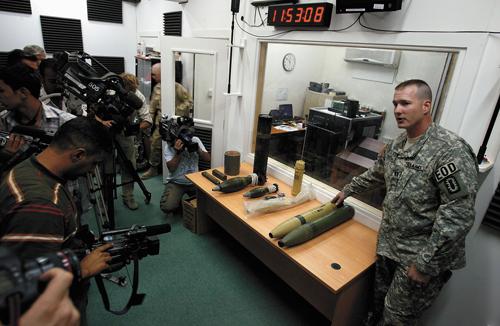Military claims Iran collaborated in attack

A US military explosives expert displays explosives used by Iraqi militants, including allegedly Iranian-made armor-penetrating roadside bomb in Baghdad, Iraq, Monday, July 2, 2007. A U.S. military spokesman in Iraq said Monday that Iran is using the Leba Wathiq Khuzaie, The Associated Press
July 3, 2007
BAGHDAD – The U.S. military accused Iran on Monday of a direct role in a sophisticated militant attack that killed five American troops in Iraq, portraying Tehran as waging a proxy war through Shiite extremists.
The claims over the January attack marked a sharp escalation in U.S. accusations that Iran has been arming and financing Iraqi militants, and for the first time linked the Iranian effort to its ally, Lebanon’s Shiite Hezbollah militia. The allegations could endanger Iraqi efforts to hold a new round of talks between the U.S. and Iran.
U.S. military spokesman Brig. Gen. Kevin J. Bergner said the Quds Force, part of Iran’s elite Republican Guards, was seeking to build an Iraqi version of Hezbollah to fight U.S. and Iraqi forces and had brought in Hezbollah operatives to help train and organize militants.
“Our intelligence reveals that the senior leadership in Iran is aware of this activity,” Bergner told a Baghdad news conference. He said it would be “hard to imagine” that Iran’s supreme leader Ayatollah Ali Khamenei did not know about the activity.
Iran has denied past claims that it was backing Iraqi militants including accusations that it was providing them with a particularly deadly type of roadside bomb, the explosively formed penetrator.
Get The Daily Illini in your inbox!
Iranian Foreign Ministry spokesman Mohammad Ali Hosseini rejected the allegations Monday, saying “American leaders have gotten into the habit of issuing ridiculous and false statements without providing evidence, with political and psychological aims.”
But Bergner said an extensive Quds Force program was revealed through interrogations of an alleged Lebanese Hezbollah operative, Ali Mussa Dakdouk, and an Iraqi militant, Qais al-Khazaali, along with documents seized with them. Both men were captured in March in the southern city of Basra.
The Quds Force is providing up to $3 million a month to Iraqi militants and bringing them to three training camps outside Tehran to learn how to carry out bombings, raids and kidnappings, Bergner said. Most of those who trained in Iran were extremists who broke away from Iraqi Shiite militias, including the Mahdi Army loyal to anti-U.S. cleric Muqtada al-Sadr, he said.
Dakdouk, a 24-year veteran of Hezbollah, was sent to Iraq “as a surrogate for the Iranian Quds Force” to finance and arm militant cells known as “special groups,” the general said.
Dakdouk told his interrogators that the militants behind the Jan. 20 surprise attack in the southern city of Karbala “could not have conducted this complex operation without the support and direction of the Quds Force,” Bergner said.
The Karbala attack was one of the most sophisticated against U.S. forces in the 4-year-old Iraqi war.
Carrying false IDs, up to a dozen fighters disguised themselves as an American security team. They got past checkpoints to reach a provincial government building, where they opened fire with machine guns and explosives. One U.S. soldier was killed in the initial attack, and four others were abducted and found shot to death soon after.






